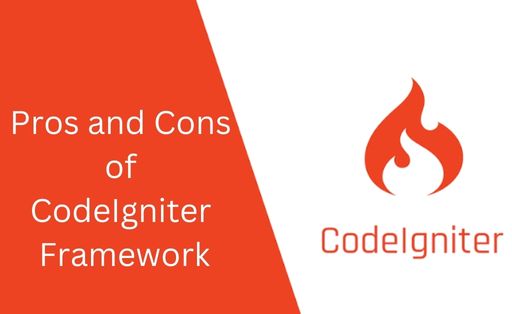CodeIgniter is one of the best PHP frameworks for developing websites, and there is no doubt about that. Every PHP developer needs to know the pros and cons of CodeIgniter before using it for web development. Although it does not have many drawbacks, it is wise to know the good and bad aspects before using it.
In this article, we analyzed some of the pros and cons of the CodeIgniter framework in detail that a CodeIgniter developer must know. It will help to decide when you need to use CodeIgniter for your development. If you already use it, you can learn how to use it more effectively.

But before diving deep into the plan, let’s understand what CodeIgniter is and why it is crucial. It will help those who are new to the CodeIgniter framework. So let’s start.
Contents
What is CodeIgniter?
CodeIgniter is a robust PHP framework with a small footprint. It is designed for developers who requires a simple and fast toolkit for developing end-to-end web applications. Despite being a lightweight web framework, CodeIgniter simplifies the creation of custom web applications for PHP developers.
As an open-source framework, it helps developers reduce web application development costs. It handles all of the system’s essential activities with high performance. It is the main reason why every web development company wants to hire a CodeIgniter developer.
Now that you’ll have a fair idea of how powerful CodeIgniter is, let’s get back to our main agenda, which is analyzing all the pros and cons of CodeIgniter so that you can make an informed decision about whether to use it or not.
Pros and cons of CodeIgniter
Pros
Lightweight and fast
It has a much smaller footprint than other PHP frameworks. For instance, CodeIgniter 4 is just a 1.2 MB download.
Because of its slim footprint, CodeIgniter is much faster than other popular PHP web frameworks. Due to this, it eliminates the performance lags and the need for developers to keep optimizing website performance continuously.
Easy to setup
CodeIgniter is very easy to set up. Both novice and experienced PHP programmers can easily use it without requiring additional time or effort to configure it. As almost everything is already set in CodeIgniter, just connect with the database, and you are good to go.
Clear documentation and robust community support make it even easier for PHP developers to use CodeIgniter to develop a wide range of web applications.
Comes with built-in security features
By default CodeIgniter has protection against CSRF as well as XSS attacks. To its security arsenal, CodeIgniter version 4 has added CSP and context-sensitive escaping. So it makes it easier for developers to write secure PHP applications, which is very important for every developer.
It protects web applications from common security threats such as SQL injection, cross-site scripting attacks, and remote code execution.
Easy to extend and customize
The small footprint makes it easier for PHP programmers to extend and customize the framework to meet their specific requirements. Developers can extend CodeIgniter further, including class extensions, custom libraries, and third-party plug-ins/add-ons.
User-friendly interface
A framework’s user interface decides how effective it is, and CodeIgniter aces in this department. It has a user-friendly interface that makes it simple to use even for beginners. Using this user interface effectively, CodeIgniter application development becomes more fluid, dynamic, secure, and flexible.
Furthermore, the ease of use of UI contributes to app development speed, effectively shortening the overall time span for larger web application projects.
Cons
Does not emphasize on code maintainability
In the current web development scenario, developers need to write readable, as well as clean and structured code. High-quality code makes it easier for them to maintain, modify, and update web applications. Developers must devote additional time and effort to maintain or update the code. CodeIgniter does not support modular code separation, unlike other PHP frameworks.
Lacks exhaustive libraries
When compared to other frameworks, CodeIgniter has fewer tools and built-in libraries. Developers can only install the libraries required for the web application.
Developers must expand the native classes to customize and extend the native libraries. However, modern frameworks have more extensive libraries than CodeIgniter’s.
Need for development of kernel files
The development of kernel files is sometimes required for the effective operation of the framework in order to make it function according to your requirements. When the core is changed, the framework faces complex challenges, so CodeIgniter web developers are compelled to program the code in such a way that the core remains unchanged. The entire practice adds to the difficulties and struggles.
Conclusion
By analyzing all the pros and cons of CodeIgniter in detail, we can conclude that CodeIgniter is a robust framework with a small footprint, security, and user-friendly interface. However, some powerful features offered by modern PHP frameworks, such as Laravel, are missing.
So, if you are a newbie, you should try CodeIgniter if you want to develop dynamic, secure, and stable websites. But experienced developers should always keep the specific needs of each project in mind to ultimately decide whether to use CodeIgniter or not.
Author Bio:
Mohit is an Engineer turned tech blogger. He loves diving deep into the tech space and has been doing it for the last three years. He calls himself a cinephile and plays badminton in his free time. For more information, you can connect with him on Linkedin or Instagram.
